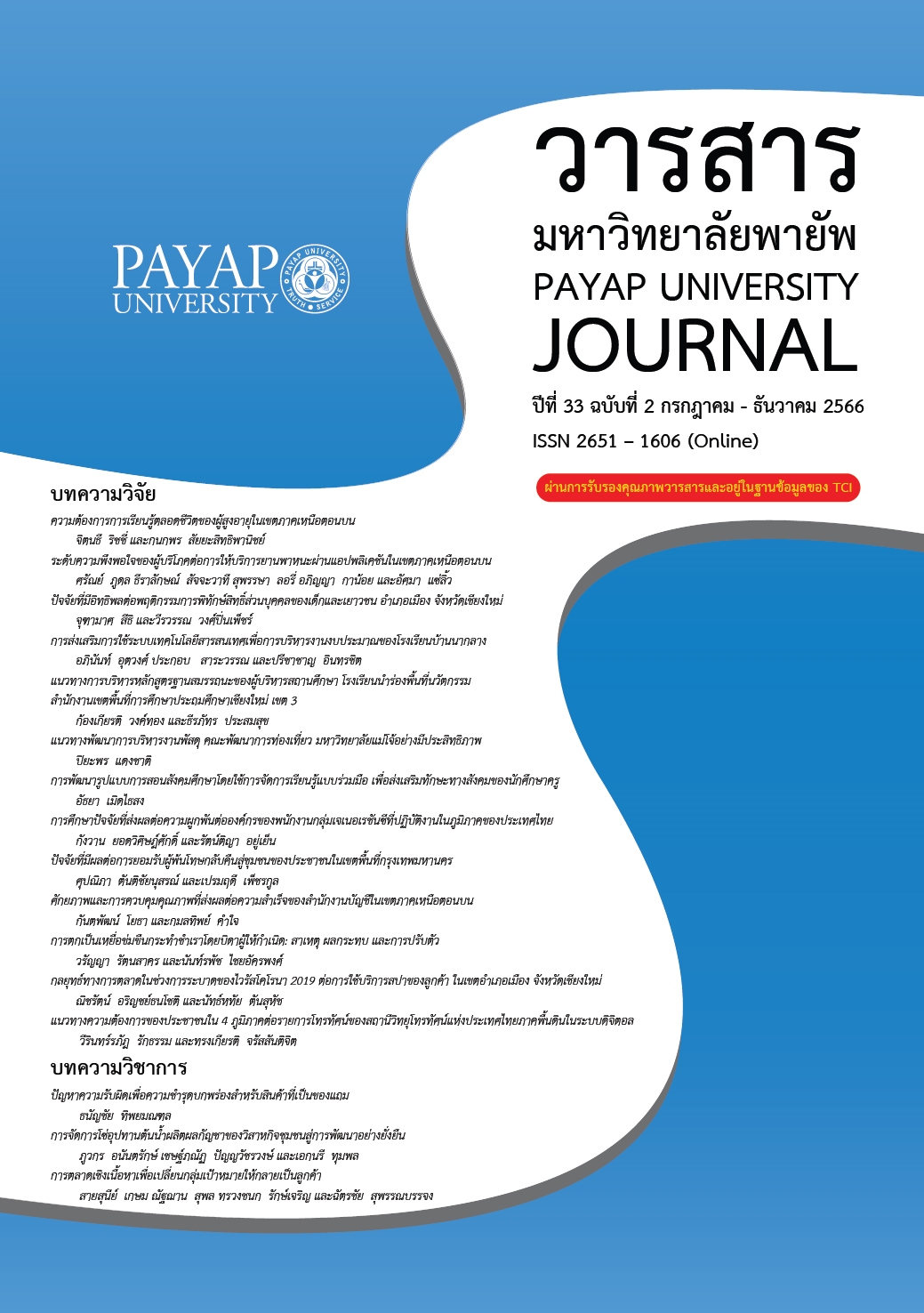ปัจจัยที่มีผลต่อการยอมรับผู้พ้นโทษกลับคืนสู่ชุมชนของประชาชนในเขตพื้นที่กรุงเทพมหานคร
Main Article Content
บทคัดย่อ
การศึกษาครั้งนี้มีวัตถุประสงค์ 1) เพื่อศึกษาถึงทัศนคติและการยอมรับของประชาชน ในเขตพื้นที่กรุงเทพมหานครต่อผู้พ้นโทษที่กลับสู่ชุมชน 2) เปรียบเทียบความแตกต่างระหว่าง ปัจจัยส่วนบุคคลของประชาชนในเขตพื้นที่กรุงเทพมหานครต่อการยอมรับผู้พ้นโทษ และ 3) ศึกษาความสัมพันธ์ระหว่างทัศนคติของประชาชนและการยอมรับผู้พ้นโทษกลับคืนสู่ชุมชน โดยเก็บข้อมูลจากประชาชนในพื้นที่กรุงเทพมหานคร จำนวน 400 คน การวิเคราะห์ทางสถิติประกอบด้วย ค่าร้อยละ ค่าเฉลี่ย และส่วนเบี่ยงเบนมาตรฐาน ใช้วิธีวิเคราะห์ความแปรปรวนระหว่างค่าเฉลี่ย t-test และ f-test และหาความสัมพันธ์ระหว่างตัวแปรโดยใช้สถิติ Chi-Square ที่ระดับนัยสำคัญทางสถิติ 0.05
ผลการวิจัยพบว่า กลุ่มตัวอย่างส่วนใหญ่มีทัศนคติเชิงบวกต่อผู้พ้นโทษ โดยมองว่าผู้พ้นโทษสามารถอยู่ร่วมกับคนในชุมชนได้ (x̅ = 3.34) แต่ควรมีมาตรการควบคุมผู้พ้นโทษที่มีคดีรุนแรง (x̅ = 4.60) ผู้พ้นโทษควรมีสิทธิเท่าเทียมกับคนทั่วไป (x̅ = 4.03) และรัฐควรให้ความช่วยเหลือเพื่อให้ผู้พ้นโทษสามารถมีชีวิตอย่างปกติสุข (x̅ = 3.96) ปัจจัยที่มีผลต่อการยอมรับผู้พ้นโทษ กลับคืนสู่ชุมชน ได้แก่ อายุ อาชีพ และช่องทางการรับรู้ข้อมูลผู้พ้นโทษ และปัจจัยด้านทัศนคติ ที่มีต่อผู้พ้นโทษมีความสัมพันธ์กับการยอมรับผู้พ้นโทษกลับเข้าสู่ชุมชน เป็นไปตามสมมติฐาน ที่ระดับนัยสำคัญทางสถิติที่ 0.05
Article Details
เอกสารอ้างอิง
กรมราชทัณฑ์. (2565, 5 มกราคม). ฐานข้อมูลผู้ต้องขังกระทำผิดซ้ำ. http://www.correct.go.th/recstats/index.php
กานต์สินี องอาจ และจันทราทิพย์ สุขุม. (2564). การมีส่วนร่วมของศูนย์ยุติธรรมชุมชนในการสร้างโอกาสฟื้นฟูผู้พ้นโทษกลับคืนสู่สังคม. http://www2.huso.tsu.ac.th/ncom/csd/csdful_pdf/f275.pdf
กฤษณพงค์ พูตระกูล และเสกสัณ เครือคำ. (2562). รายงานวิจัยฉบับสมบูรณ์ การพัฒนาประสิทธิภาพของระบบงานราชทัณฑ์ไทยเปรียบเทียบกับประเทศมาเลเซีย. สำนักงานคณะกรรมการส่งเสริมวิทยาศาสตร์ วิจัยและนวัตกรรม. https://digital.library.tu.ac.th/tu_dc/frontend/Info/item/dc:166518
ณชพัฒน์ อัศวรัชชนันท์. (2554). รายงานวิจัยทัศนคติและพฤติกรรมการใช้บริการเครื่องจำหน่าย. น้ำดื่มแบบหยอดเหรียญของผู้พักอาศัยในอพาร์ทเม้นท์ในจังหวัดนนทบุรี. มหาวิทยาลัยราชพฤกษ์. http://www.rpu.ac.th/Library_web/doc/RC_RR/2554_Market_Nachaphat.pdf
ไท วัฒนา. (2564, 2 สิงหาคม). แนวทางการนำผู้ต้องขังคืนสู่สังคมเพื่อให้ดำเนินชีวิตได้ตามปกติ (Social Reintegration). Research café. https://researchcafe.tsri.or.th/social-reintegration/
ไทยรีฟอร์ม. (2560, 28 มกราคม). ผู้พ้นโทษ=คนจนใหม่ รอสังคม “ให้” โอกาสคนเคยพลาด. สำนักข่าวอิสรา. https://www.isranews.org/content-page/item/53618-jus.html
ปูรณิมา. (2564, 10 ธันวาคม). กะเทาะปัญหาอาชญากรรม ปี 64 พุ่งไม่หยุด ภัยสังคมซ้ำเติมประชาชนห้วงโควิด. ไทยรัฐ. https://www.thairath.co.th/scoop/theissue/2262011
พระราชบัญญัติระเบียบข้าราชการพลเรือน พ.ศ.2551. (2551, 25 มกราคม). ราชกิจจานุเบกษา. เล่ม 125 ตอนที่ 22ก. หน้า 1-54.
พระราชบัญญัติประมวลกฎหมายอาญา พ.ศ. 2499. (2499, 15 พฤศจิกายน). ราชกิจจานุเบกษา. เล่ม 73 ตอนที่ 95ก. หน้า 1-123.
วันชนะ เปลื้องวัลย์ และวิเชียร ปรีชาธรรมวงศ์. (2565). ปัจจัยที่มีความสัมพันธ์ต่อการยอมรับผู้พ้นโทษของผู้ประกอบการวิสาหกิจขนาดย่อม ในเขตกรุงเทพมหานคร. วารสารสังคมศาสตร์และมนุษยศาสตร์, 48(1), 151-170.
ศูนย์บริหารข้อมูลตลาดแรงงานภาคเหนือ. (2562). บุคลิกภาพและทักษะทางอาชีพของผู้ใกล้พ้นโทษและความต้องการจ้างงานของนายจ้าง กรณีศึกษา: เรือนจำกลางลำปาง. กรมการจัดหางาน.
เสริน ปุณณะหิตานนท์. (2558). การกระทำผิดในสังคม: สังคมวิทยาอาชญากรรมและพฤติกรรมเบี่ยงเบน. [วิทยานิพนธ์มหาบัณฑิต, จุฬาลงกรณ์มหาวิทยาลัย].
เสาวคนธ์ เจษฎารักษ์ และรัชนีกูล ภิญโญภานุวัฒน์. (2563). การพัฒนาตัวชี้วัดการพัฒนาพฤตินิสัย เพื่อสร้างการยอมรับของสังคมต่อผู้พ้นโทษ, วารสารศรีปทุมปริทัศน์ ฉบับมนุษยศาสตร์และสังคมศาสตร์, 21(2), 140-153.
Foucault, M. (1966). The order of things: An archaeology of the human sciences. Pantheon Books.
Goffman, E. (1963). Stigma: Notes on the management of a spoiled identity. Prentice Hall.
Ramakers, A., Apel, R., Nieuwbeerta, P., Dirkzwager, A., & Wilsem, J. (2014). Imprisonment length and post-prison employment prospects. American Society of Criminology, 52(3), 399-427.
Roger, E. M. (1983). Diffusion of innovation (3rd ed.). The Free Press.


